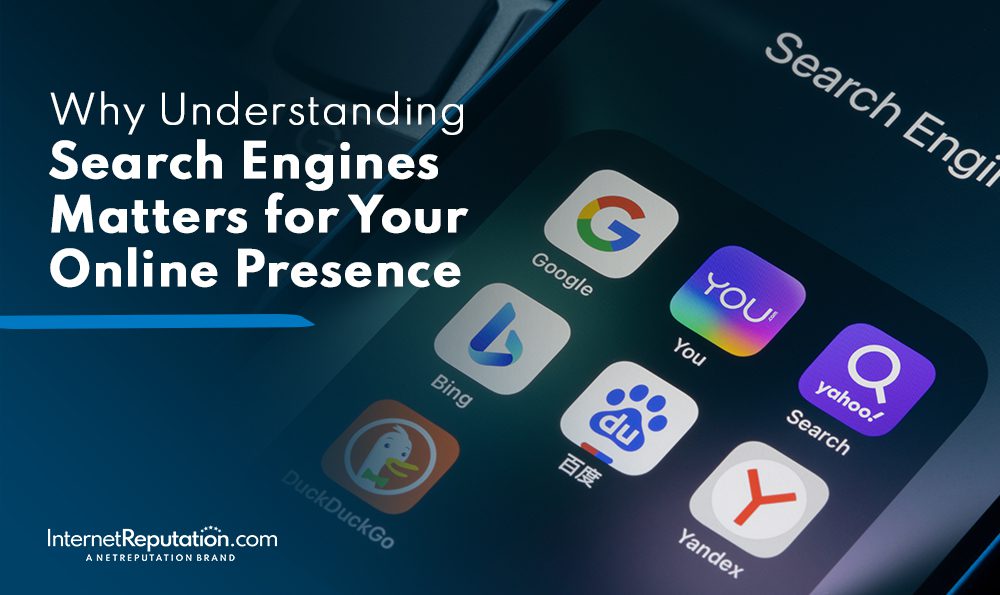Why Understanding Search Engines Matters for Your Online Presence

Search engines are crucial in determining online visibility and success for businesses, content creators, and individuals aiming to enhance their personal brands.
What Are Search Engines?
Search engines are sophisticated systems that facilitate information access. They organize and present relevant content in response to user queries. An internet search engine indexes and retrieves information from the web, distinguishing it from other search engines, such as enterprise and desktop search engines.
Search engines employ algorithms and crawlers to analyze vast amounts of data from websites. They rank this data based on various factors to ensure users receive the most pertinent results quickly.
Understanding the functionality of search engines, preeminent players like Google is crucial for businesses aiming to enhance their online visibility and improve their digital marketing efforts. With proper search engine optimization (SEO), websites can achieve high rankings, significantly impacting their overall performance and audience reach.
How Do Search Engines Work?
Search engines use algorithms and web crawlers to discover and index content from across the web. They apply complex algorithms to rank this information based on relevance to search queries.
These crawlers, also known as spiders or bots, systematically traverse various web pages. They gather valuable data on their structure and content. Once the content is collected, it undergoes a meticulous indexing process. Search engines organize it in vast databases during indexing to ensure quick access during user queries.
This indexing is crucial because it forms the foundation for retrieving information. It enables users to find what they want quickly.
The final piece of the puzzle is ranking, which determines the order in which results appear on the search results page. Factors like keyword relevance, page loading speed, and mobile friendliness are considered during this phase, which means website optimization becomes essential for higher visibility.
This crawling, indexing, and ranking triad shapes how effectively a website performs in search engine results. Ultimately, it drives traffic and improves user engagement.
Why Is Understanding Search Engines Important?
Understanding search engines is critical for businesses aiming to optimize their online presence. It is also essential for effectively reaching their target audience in today’s competitive digital landscape.
Search engines support various processes and industries. They facilitate access to vast data, from legal research to healthcare information, streamlining the research and discovery process across numerous fields.
An in-depth knowledge of how search engines function enables brands to craft effective marketing strategies that resonate with consumer behavior and preferences. This understanding not only aids in improving site rankings but also enhances brand credibility and awareness. Thus, it is an essential pillar of any comprehensive digital marketing plan.
How Search Engines Affect Your Online Presence?
Search engines play a pivotal role in determining a business’s online visibility. They directly impact user experience and traffic to their website.
Positioning a site in search results is not merely a matter of prestige. It fundamentally affects how potential customers perceive a brand. As the most popular search engine, Google’s dominant market position significantly influences user perception and visibility.
When a website appears on the first page of search results, users often associate it with credibility and authority. As such, improved search engine rankings can lead to heightened user engagement. Visitors are more likely to click through to a well-ranked site.
Higher visibility draws more organic traffic. Increased traffic correlates with better user interaction. Effective engagement strategies can eventually boost conversion rates.
Understanding the relationship between search engines and user behavior is vital. Businesses aiming to optimize their online presence and implement robust marketing strategies must recognize this.
What Are the Benefits of Understanding Search Engines?
Understanding search engines offers several benefits. These include improved website performance, enhanced SEO strategies, and a competitive advantage in the digital marketplace.
A thorough grasp of how these systems operate enables businesses to fine-tune their content. It also helps them identify the most effective keyword research techniques tailored to their audiences. SEO strategies are specifically designed to improve visibility and ranking on internet search engines. These platforms help users quickly find relevant information online.
Leveraging this knowledge can vastly improve online visibility, leading to:
- Higher organic traffic
- Better conversion rates
- Increased brand awareness
Organizations can make informed decisions by prioritizing search engine insights in their marketing strategies. This allows them to stay ahead of their competitors while maximizing their digital marketing investments. Ultimately, a deep understanding of search engines enables brands to create relevant, user-focused content that resonates with their target demographic.
What Factors Affect Search Engine Rankings?
Several key factors significantly influence search engine rankings. These include content quality, website optimization, and user engagement.
Submitting your website to multiple search engines can help reach a wider audience. This is done by being indexed across different platforms, though caution is advised to avoid generating unnatural links.
A well-optimized website that prioritizes user experience and relevant content can enhance visibility and drive organic traffic, aligning seamlessly with overall marketing strategies.
Furthermore, keywords are vital for SEO. They serve as the bridge between user queries and website content. Thus, thorough keyword research enables businesses to tailor their content to meet audience needs, ultimately improving engagement and rankings.
In addition, high-quality, engaging content fosters trust and encourages organic backlinks, which are essential for effective SEO. Moreover, effective website design and user experience—particularly mobile optimization and fast loading times—are crucial for retaining visitors.
Lastly, backlinks play a critical role in establishing brand credibility and authority. By acquiring quality links from reputable sites, businesses can significantly boost their rankings and organic traffic. Companies can strengthen their online presence and enhance overall site performance by focusing on these elements.
Search Engine Personalization
Search engine personalization refers to tailoring search results to individual users based on their search history, location, and other factors. This approach aims to provide users with more relevant and accurate results, enhancing their overall search experience.
However, it also raises concerns about bias and the potential for users to be trapped in “filter bubbles.”
How Personalization Impacts Search Results
Personalization can impact search results in several ways:
- Location-based results: Search engines prioritize results relevant to a user’s location. For instance, if you search for “coffee shops,” the search engine will likely show you nearby options. This makes it easier to find local businesses or services.
- Search history: By considering a user’s search history, search engines can provide more tailored results. If you frequently search for tech news, the search engine might prioritize tech-related articles in future searches.
- Device and browser: Your device and browser can influence search results. For example, a search conducted on a mobile device might yield results optimized for mobile viewing, ensuring a better user experience.
- User behavior: Search engines analyze user behavior, such as click-through rates and dwell time, to gauge the relevance of search results. This helps refine the results to match user preferences better.
While personalization can enhance the relevance of search results, it also raises concerns about bias and the potential for users to be trapped in “filter bubbles.” Filter bubbles occur when users are only exposed to information that aligns with their existing beliefs or interests, limiting their exposure to diverse perspectives.
The Impact of AI on Search Engines
Artificial intelligence (AI) has revolutionized how search engines work. It enables them to provide more accurate and relevant results. AI-powered search engines can analyze vast amounts of data, understand natural language, and learn from user behavior, significantly enhancing the search experience.
AI Innovations and Their Influence on Search Algorithms
Several AI innovations have influenced search algorithms, including:
- Natural Language Processing (NLP): NLP allows search engines to understand the nuances of natural language. This makes it possible to interpret complex queries and provide more accurate results.
- Machine Learning: Machine learning algorithms enable search engines to learn from user behavior. They adapt to changing search patterns, continuously improving the relevance of search results.
- Deep Learning: Deep learning algorithms can analyze vast amounts of data and identify complex patterns, enhancing the search engine’s ability to deliver precise results.
- Knowledge Graphs: Knowledge graphs help search engines understand the relationships between different pieces of information, allowing them to provide more comprehensive and relevant results.
These AI innovations have significantly improved the accuracy and relevance of search results. However, they also raise concerns about bias and the potential for users to be trapped in “filter bubbles.”
Search Engine Bias and Concerns
Search engine bias refers to the phenomenon where search engines prioritize specific results over others. This often occurs due to algorithmic or human biases. It can expose users to a limited range of perspectives rather than diverse information.
Understanding Bias and Its Implications for Users
Bias can manifest in several ways, including:
- Algorithmic bias: This occurs when search engines prioritize specific results over others due to biases embedded in the algorithm. For example, an algorithm might favor content from well-established websites over newer, potentially more relevant sources.
- Human bias: Human bias can influence search results when the data used to train algorithms or content curation reflects the biases of the individuals involved.
- Confirmation bias happens when search engines prioritize results that confirm a user’s beliefs or interests. This occurs rather than presenting a diverse range of perspectives.
Bias can have significant implications for users, including:
- Limited exposure to diverse perspectives: Users may only see information that aligns with their existing views, missing out on a broader range of insights.
- Reinforcement of existing beliefs: Users’ beliefs may be reinforced, making it harder to consider alternative viewpoints.
- Lack of critical thinking: Without exposure to diverse perspectives, users may not develop the critical thinking skills to evaluate information effectively.
To mitigate bias, search engines can implement several strategies, including:
- Diversifying search results: Providing a range of perspectives in search results can help users access a broader spectrum of information.
- Providing transparency: Offering transparency into algorithms and data sources can help users understand how results are prioritized.
- Encouraging critical thinking: Search engines can promote critical thinking by providing tools and resources to help users evaluate information critically.
By addressing these concerns, search engines can ensure users a more balanced and informative search experience.
How to Optimize Your Online Presence for Search Engine Optimization?
Optimizing your online presence for search engines, especially Google Search, involves several key practices. These include effective keyword research, high-quality content creation, improved website design, and building quality backlinks.
Given Google’s dominance and powerful algorithms, it is crucial to focus on SEO. This will improve visibility and ranking in search results. Optimizing for popular search engines like Google, Bing, and Yahoo is significant. These are leading platforms that allow users to search for information online.
Effective keyword research ensures your content aligns with user search queries. Understanding user intent allows for creating valuable, informative pieces to enhance rankings. High-quality content fosters a positive user experience and drives organic traffic, essential for brand credibility.
Moreover, research indicates that 53% of mobile users abandon sites that load over three seconds. This emphasizes the importance of site speed and mobile optimization. Lastly, building quality backlinks serves as votes of confidence from other sites, improving credibility and authority.
By implementing these strategies, businesses can significantly enhance their online visibility and user engagement.
What Are Some Common Mistakes in Understanding and Optimizing for Search Engines?
Several common mistakes can undermine SEO efforts and negatively impact search engine results page rankings. These include keyword stuffing, producing low-quality content, and employing black hat SEO techniques.
Keyword stuffing, an outdated tactic, involves overloading content with keywords. This leads to poor user experience and lower rankings, as search engines prioritize high-quality, valuable content. Similarly, low-quality content that lacks depth and relevance diminishes user engagement. This results in high bounce rates and negatively impacts SEO performance.
Neglecting website design and user experience also contributes to low rankings. A well-structured, user-friendly site encourages exploration and engagement, while cluttered layouts and slow loading times frustrate visitors.
Lastly, using black hat SEO techniques may yield short-term gains but can lead to severe penalties, damaging credibility and brand reputation. Instead, focusing on ethical practices like genuine content creation, effective link building, and enhancing user experience can foster a sustainable online presence and ensure long-term success.



